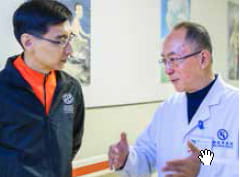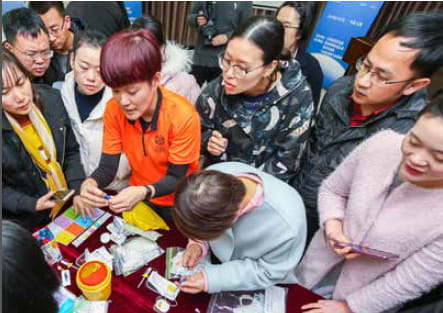Stories > The Final Lap
The Final Lap
Having a good life includes access to a dignified end that’s as peaceful as possible. Team leaders of SIF’s palliative care projects share what motivates and challenges them in the work they do.
BY Therese Tay
nly about 14 per cent of people in need of palliative care currently receive treatment worldwide – according to the World Health Organization (see sidebar) – a number that is expected to grow with the rising burden of noncommunicable diseases and ageing populations.
Singapore philanthropic house Lien Foundation cites a government project that estimates the annual need for local palliative care to rise from 5,000 to 6,000 patients in 2013, to more than 10,000 patients per year in 2023.
|
In comments acknowledging the crucial need to develop the sector, Singapore President Halimah Yaacob emphasises: “It is important to ensure that we continue to give strong support for affordable, accessible and good quality palliative care so that people can die with dignity.” As of 2015, Singapore was ranked second in Asia, behind Taiwan, and 12th globally in the Quality of Death Index compiled by the Economist Intelligence Unit. The study surveyed and assessed 80 countries in five categories: palliative and healthcare environment, human resources, the affordability and quality of care, as well as the level of community engagement in the country.
HELPING OTHERS HELP THEMSELVES |
Dr Wu Huei Yaw (left) from TTSH will head SIF’s first collaborative effort in palliative care sector in China. |
Recent initiatives in Bandung and Yunnan help to address an urgent need and build capacity among medical professionals, who are equipped not only with skillsets, knowledge and expertise, but also the confidence and know-how to train their fellow healthcare providers.
“Even though we are living longer, we still have to face death eventually,” says Dr Ramaswamy Akhileswaran, a senior consultant at Khoo Teck Puat Hospital and one of Singapore’s top palliative care experts.
“A person who is faced with a terminal illness struggles with many areas of his life: physical, psycho-emotional and spiritual. Palliative care provides a holistic approach that takes all these areas into account, supporting not just the patient but also his family and next-of-kin.”
Dr Akhileswaran leads the SIF’s palliative care initiative in Bandung, which builds on the success of two earlier ones in Jakarta and marks the organisation’s third collaboration with Indonesia in this field. Held in partnership with the Indonesian Cancer and the Dr Hasan Sadikin General Hospital Bandung (RSHS), the Enabling Palliative Care Trainers project (EnPaCT) aims to enhance the quality of life for patients with life-threatening illnesses, in the province of West Java with over 46 million residents.
END OF LIFE CARE40 million The number of people worldwide in need of palliative care 78% The percentage of people requiring palliative care who live in developing countries 20 The number of countries that have achieved integration of palliative care with wider health services 83% The percentage of the world’s population living in countries with low to non-existent opioid pain relief 42% The percentage among all 234 UN-recognised countries with no palliative care services at all World Health Organization statistics, 2011, 2012, 2017 |
A training-of-trainers programme will be conducted to help at least 350 medical professionals become advocates for better end-of-life care over the next three years.
Significantly, EnPaCT will also witness the re-engagement of five master trainers from Jakarta volunteering as mentors to trainees in Bandung.
“Enhancing palliative care in West Java is an important development as it can improve access to palliative care across the entire region,” states RSHS President Director Dr R Nina Susana Dewi.
Along with the SIF’s earlier palliative care projects in Jakarta, EnpaCT is expected to collectively benefit at least 100,000 lives in Indonesia.
In Yunnan, which marks the SIF’s first foray into palliative care in China, the team is headed by Dr Wu Huei Yaw. Specialist Singapore International Volunteers (SIV) from Tan Tock Seng Hospital (TTSH) will train some 50 doctors and nurses from the palliative, oncology and geriatric departments at the Yunnan New Kunhua Hospital (NKH), palliative care facilities in the provincial capital, Kunming, as well as its surrounding counties, between now and 2021.
|
A skilled team of volunteers from TTSH will train nurses and doctors in China’s Kunming province and surrounding counties. |
Topics such as pain management, symptom management and psycho-social care will be delivered via symposiums, training workshops and study visits to Singapore. This new partnership builds on the success of an earlier SIF project in Yunnan to enhance healthcare services for an ageing population. The three-year project concluded in 2018 and positively impacted close to 800 medical practitioners. A senior consultant at TTSH, Dr Wu recalls how he came to volunteer with the SIF. “Our department is fairly wellestablished, and we thought it would be a good idea to extend beyond our four walls by helping those in another country develop their end-of-life services and related skills.” Dr Wu hopes that this sharing of knowledge will build a self-sustaining system as his Chinese counterparts become trainers themselves. |
His optimism is shared by NKH head Tang Jianzhong, who expects the programme to “benefit both our patients as well as the wider healthcare community” in Yunnan.
“SIF’s Palliative Care Project In Bandung Marks Its Third Collaboration In This Field With Indonesia.”
BRIDGING CULTURAL TABOOS
Having led specialist SIV teams to Jakarta for nearly a decade, Dr Akhileswaran is no stranger to capacity building missions overseas.
From 2009 to 2012, he headed the SIF’s Palliative Care for Children project. The partnership with Indonesia’s first palliative care service for terminally-ill children – Rachel House – saw its homecare model endorsed by the Indonesian National Association of Nurses.
From 2015 to 2018, he again led the Enhancing Palliative Care Practice project, which resulted in the formation of a national integrated referral system of 12 hospitals for patients in the country’s capital.
Yet, in countries where palliative care is not always well understood, taboos surround talking about death openly.
“To some extent, it is natural to want to avoid giving, and talking about, bad news. Healthcare providers and caregivers fear it may negatively affect patients,” says Dr Akhileswaran.
“We have to explain to our counterparts what research has shown: that proper palliative care helps patients come to terms with what is, and will be, happening to them. It also prepares patients and their loved ones for the future.”
Compounding the issue is a general aversion to using morphine – a common drug given to ease the patient’s pain and suffering – that may be linked to its potential for narcotic drug abuse. With education and patient explanation, however, Dr Akhileswaran has witnessed a change in attitudes.

Dr Akhileswaran (top left) and his team (top right) not only help build capacity among healthcare professionals in Indonesia, they also educate them on how to break the taboos associated with death and terminal illnesses.
Speaking about a three-day training module in Bandung, he says: “On Day 1, people were rather quiet. By Day 3, most of them were extremely excited by what they can do to help their patients.”
He is heartened to note that local doctors had embraced this new approach by administering morphine to several breast cancer patients by the SIV team’s next hospital visit.
Similarly, Dr Wu saw death being a taboo subject in China. “During our field trip, we observed that many hospitals do not employ social workers to help patients cope with their psycho-emotional issues,” he recounts.
“Psycho-social care is an important and strongly-emphasised aspect of palliative care. We hope to bring this awareness to our Chinese counterparts so they can build their capability in this area.”
His team also discovered the phenomenon of “collusion” – whereby doctors are told by patients’ next-of-kin not to disclose the diagnosis of cancer or other terminal illnesses. Much of this, he explains, may be attributed to discomfort in discussing death and misplaced fears that the patient’s condition could deteriorate. In this regard, Dr Wu observed a contrast to the approach in Singapore, where death is explored more openly.
“By teaching communication methods in the future, we hope to share how to break the practice of collusion. At the same time, we want to help our Chinese friends raise awareness about the topic of death through public education,” he states.
“Death Is Never Easy. But When We See Patients Find Some Empowerment Despite Their Sad Diagnosis, Instead Of Just Despairing In Pain And Not Comprehending What’s Happening, That’s When We Know We Have Managed To Inject Some Positivity Into The Situation.”
Dr Ramaswamy Akhileswaran, Senior Consultant, Khoo Teck Phuat Hospital
OVERCOMING CHALLENGES THROUGH PARTNERSHIPS
Differences in attitude were not the only barriers that needed to be overcome.
“English is not used in their day-to-day work, so it is a challenge both to explain what is going on, and to use the correct medical terms in Bahasa Indonesia,” Dr Akhileswaran explains.
To resolve this issue, his team leveraged the language skills of medical staff previously trained in Jakarta, who are now acting as trainers and interpreters for EnPaCT. “They became advocates for us and their experiences made it even more empowering and real for our trainees in Bandung.”
One of these advocates is Dr Venita Eng, a YKI doctor trained by SIVs from 2015 to 2018. “I feel very humbled and grateful to be selected as a mentor for this project,” she says.
“Dr Akhileswaran not only enriched us in clinical skills but also taught us about the ‘heart’ of palliative care. I am now ready to pass on what I know to others.” Indeed, seeing patients and partners benefit from their efforts keeps both doctors motivated. Describing his Chinese counterparts as “eager learners”, Dr Wu cites their positive attitude – along with the grateful realisation that palliative care is readily available in Singapore – as an impetus to continue with his work.
Despite being used to the practicality and efficiency here, he reminds himself that effecting positive change in another community will take time.
“Death is never easy. But when we see patients find some empowerment despite their sad diagnosis, instead of just despairing in pain and not comprehending what’s happening, that’s when we know we have managed to inject some positivity into the situation,” concludes Dr Akhileswaran.


